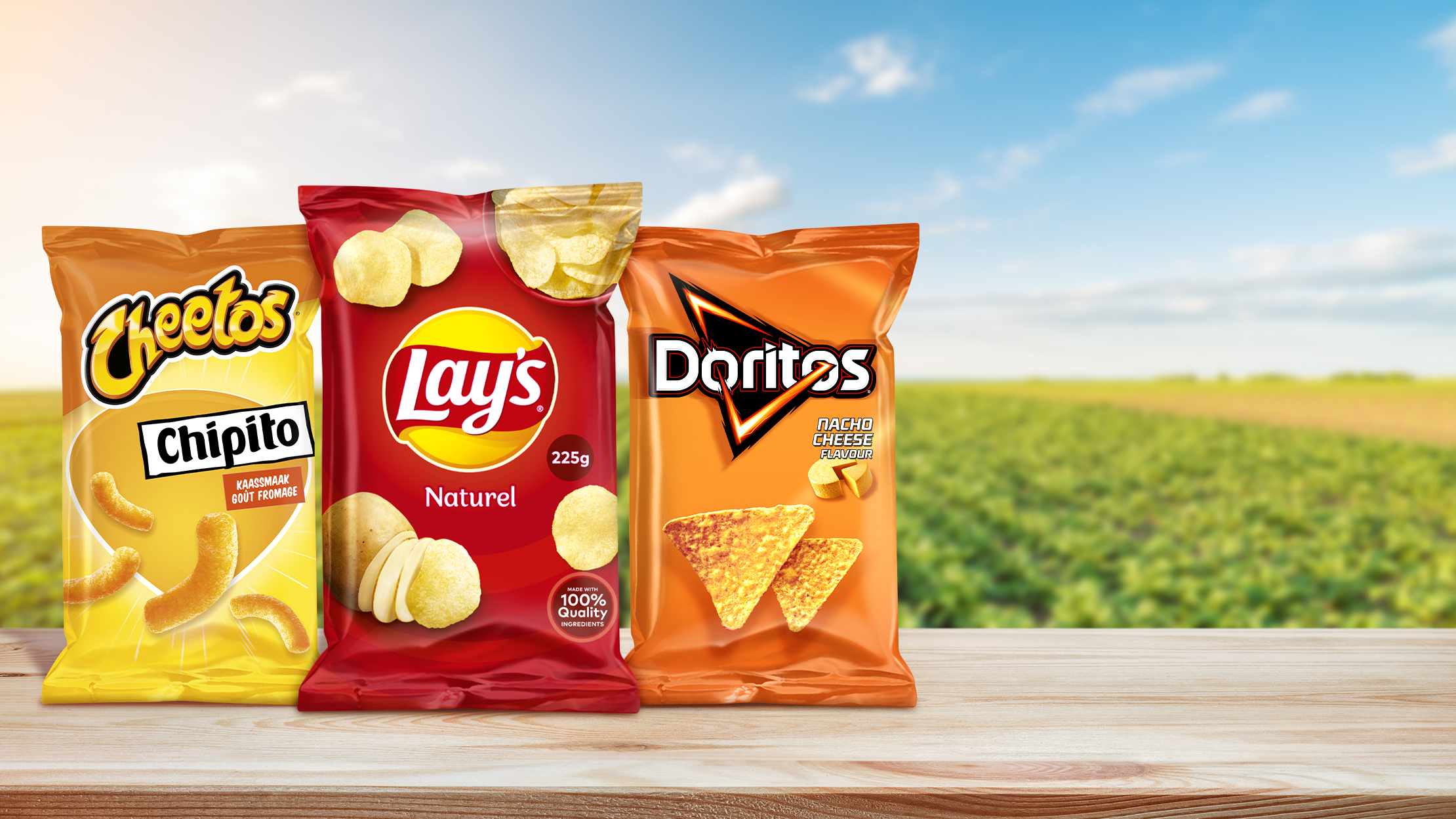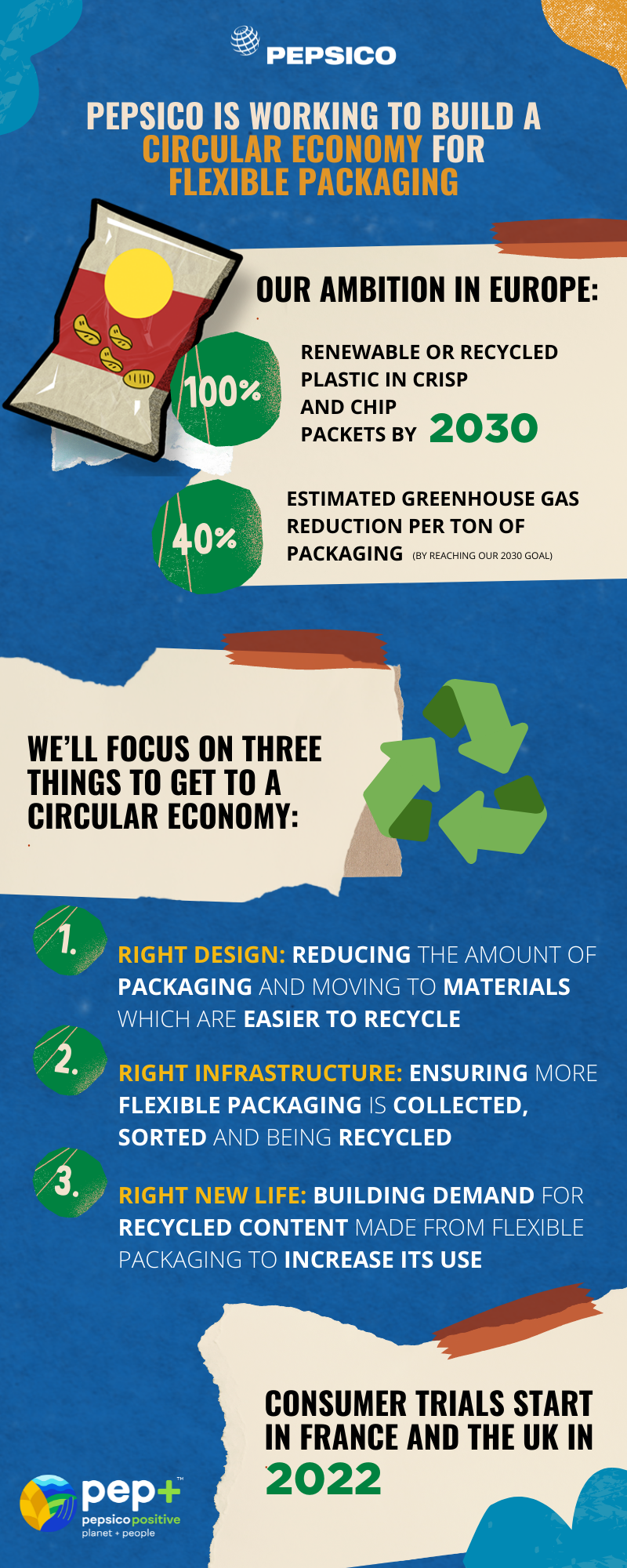
- Sets new ambition to use 100% recycled or renewable plastic in all packets by 2030, reducing greenhouse gases from film packaging by up to 40%
- Consumer trials will be rolled out in markets from this year
- PepsiCo will work to build a circular economy for flexible packaging in Europe through design, infrastructure and giving packaging materials a new life, as part of its wider pep+ (PepsiCo Positive) ambition.
[25 January 2022] Following the introduction of PepsiCo Positive, the company’s strategic end-to-end transformation with sustainability at the centre,
PepsiCo Europe today announces that by 2030, it plans to eliminate virgin fossil-based plastic in all its crisp and chip bags. This ambition will apply to brands including Walkers, Doritos, and Lay’s and will be delivered by using 100% recycled
or renewable plastic in its packets.
Consumer trials of the packaging will begin in European markets in 2022, starting with renewable plastic in a Lay’s range in France in the first half of the year. Later in the year, a range from the Walkers brand in the UK will trial recycled content.
The recycled content in the packs will be derived from previously used plastic and the renewable content will come from by-products of plants such as used cooking oil or waste from paper pulp. PepsiCo estimates it may achieve up to 40% greenhouse
gas emissions reduction[1] per ton
of packaging material by switching to virgin fossil-free material.
Silviu Popovici, Chief Executive Officer, PepsiCo Europe commented: “Flexible packaging recycling should be the norm across Europe. We see a future where our bags will be free of virgin fossil-based plastic. They will be part of a thriving circular
economy where flexible packaging is valued and can be recycled as a new packet. We’re investing with our partners to build technological capacity to do that. We now need an appropriate regulatory landscape in place so that packaging never becomes
waste.”
PepsiCo uses flexible plastic for its snack packaging – the soft wrapping used to make its crisp and chip bags because it is lightweight compared to alternative packaging and therefore has a low carbon footprint. It is also highly effective at keeping
food fresh thereby reducing food waste. However, PepsiCo recognises that change is needed to reduce the amount of virgin fossil-based plastic that is used and to drive circularity in flexible packaging. PepsiCo Europe will focus its work on three
strategic pillars: the right design; the right infrastructure and the right new life for flexible packaging.
Beyond the switch to renewable and recycled content, PepsiCo has developed its “Making Bags Better” program, that will focus on a series of investments and innovations so more flexible plastics will be recycled and reused in Europe.
The right design
PepsiCo Europe is moving all its bags to materials that make them easier to recycle, leveraging innovative design technology to create a simpler bag structure. The new bag designs contain greater proportions of recyclable plastics like Polypropylene,
commonly referred to as ‘mono-materials’. These meet the design for recycling guidelines developed by the Circular Economy for Flexible Packaging (CEFLEX) which have been agreed by a range of stakeholders active in the flexible packaging
value chain.
Gerald Rebitzer, Sustainability Director at AMCOR, PepsiCo’s flexible packaging partner in Europe, shared: “We are building a future where flexible packaging is part of the circular economy. Together with PepsiCo, we enhanced the material
technologies on PepsiCo’s new crisp packet to make it easier to recycle. And we are beginning to integrate renewable and recycled content into PepsiCo’s packaging. To meet the demands of our clients like PepsiCo, we encourage more partners
upstream to invest in the supply chains of these new materials.”
PepsiCo has also been working to reduce unnecessary packaging across its individual bags and multipacks as part of its commitment to a 50% reduction in virgin plastic per serving by 2030. Progress is being made towards this goal, including in markets
such as the UK where on some parts of the range, PepsiCo has reduced its multipack outer by up to 30% using innovative technology in its manufacturing facilities.
The right infrastructure
PepsiCo is committed to investing in infrastructure to give flexible packaging the chance of a second life and in advocating for policy changes that will make that possible. This includes collaborating on and financing the development of effective waste
collection systems in Europe and investing in schemes such as the Flexible Plastics Fund in the UK and REFLEX in Poland. As part of this approach PepsiCo Europe is advocating to set ambitious recycling targets for flexible packaging including accelerating
the ban on landfill and to swiftly adopt EPR (Extended Producer Responsibility) fees that drive collection, sorting and actual recycling of flexible film. PepsiCo is also investing in technology to further scale and improve sorting and recycling,
trialling smart packaging on several brands in 2022 in Germany and France as part of the Holy Grail 2.0 Digital Watermarks initiative.
PepsiCo is working with partners in the recycling industry such as Borealis and TOMRA to progress advanced recycling technologies for flexible packaging.
The right new life
PepsiCo will focus on building demand for recycled content made from flexible packaging to support its use more widely. Alongside the company’s planned trials of recycled plastic this year, the company is also continuing to explore new life possibilities
for its snack bags. While the goal for PepsiCo is bag-to-bag circularity which is suitable for food packaging, it is clear that collection, advanced sortation, and recycling of flexible films to produce valuable and durable products is an important
first step towards a circular future for flexible packaging. For this reason, PepsiCo is also exploring the conversion of packets into plastic pellets to be remade into items such as floor posts and as parts within the automotive industry.
The announcement today is the latest in the company’s ambitious plans to build a world where packaging never becomes waste, one of the focus areas of PepsiCo Positive. The company has already announced its plans to transform its beverage packaging.
It will transition brand Pepsi into 100% recycled plastic (100% rPET) bottles in 10 European markets by 2022 and also continue investing in building a reusable model, including through SodaStream, which aims to avoid an estimated 200 billion plastic
bottles by 2030.
“Through collaboration and innovation, we can progress to a viable circular economy for our food packaging in Europe,” shared Archana Jagannathan, Senior Director, Sustainable Packaging, PepsiCo Europe. “Today, the supply of recycled
and renewable materials for flexibles is limited. The regulatory environment is very dynamic and we need more clarity on policy and recognised technologies. If a policy and waste infrastructure, similar to beverage bottle packaging accelerates
for flexibles, we will speed up our plans and go even faster to meet our commitments.”

Media Contact: katie.omahony@pepsico.com
About PepsiCo
PepsiCo products are enjoyed by consumers more than one billion times a day in more than 200 countries and territories around the world. PepsiCo generated $70 billion in net revenue in 2020, driven by a complementary beverage and convenient foods
portfolio that includes Lays, Doritos, Cheetos, Gatorade, Pepsi-Cola, Mountain Dew, Quaker, and SodaStream. PepsiCo's product portfolio includes a wide range of enjoyable foods and beverages, including many iconic brands that generate more than
$1 billion each in estimated annual retail sales.
Guiding PepsiCo is our vision to Be the Global Leader in Beverages and Convenient Foods by Winning with PepsiCo Positive (pep+). pep+ is our strategic end-to-end transformation that puts sustainability at the center of how we will create value and
growth by operating within planetary boundaries and inspiring positive change for planet and people. For more information, visit www.pepsico.com.
Cautionary Statement
This release contains statements reflecting our views about our future performance that constitute "forward-looking statements" within the meaning of the Private Securities Litigation Reform Act of 1995. Forward-looking statements are identified through
the inclusion of words such as "aim," "anticipate," "believe," "drive," "estimate," "expect," "goal," "intend," "may," "plan," "project," "strategy," "target" and "will" or similar statements or variations of such terms and other similar expressions.
Forward-looking statements inherently involve risks and uncertainties that could cause actual results to differ materially from those predicted in such statements, including the impact of COVID-19; future demand for PepsiCo's products; damage
to PepsiCo's reputation or brand image; issues or concerns with respect to product quality and safety; PepsiCo's ability to compete effectively; water scarcity; changes in the retail landscape or in sales to any key customer; disruption of PepsiCo's
supply chain; political or social conditions in the markets where PepsiCo's products are made, manufactured, distributed or sold; future cyber incidents and other disruptions; climate change or measures to address climate change; imposition or
proposed imposition of new or increased taxes aimed at PepsiCo's products; imposition of limitations on the marketing or sale of PepsiCo's products; changes in laws and regulations related to the use or disposal of plastics or other packaging
of PepsiCo's products; and failure to comply with applicable laws and regulations. For additional information on these and other factors that could cause PepsiCo's actual results to materially differ from those set forth herein, please see
PepsiCo's filings with the Securities and Exchange Commission, including its most recent annual report on Form 10-K and subsequent reports on Forms 10-Q and 8-K. Investors are cautioned not to place undue reliance on any such forward-looking statements,
which speak only as of the date they are made. PepsiCo undertakes no obligation to update any forward-looking statements, whether as a result of new information, future events or otherwise.
. Based on a Cradle to Grave
Lifecycle Assessment provided by Franklin Associates, A Division of ERG, using cut off methodology, a mix of data provided by suppliers and industry, and an estimated 2030 end of life scenario. This Assessment includes carbon storage credits,
waste-to-energy electricity production credits, and avoided legacy waste treatment credits.
Topics: